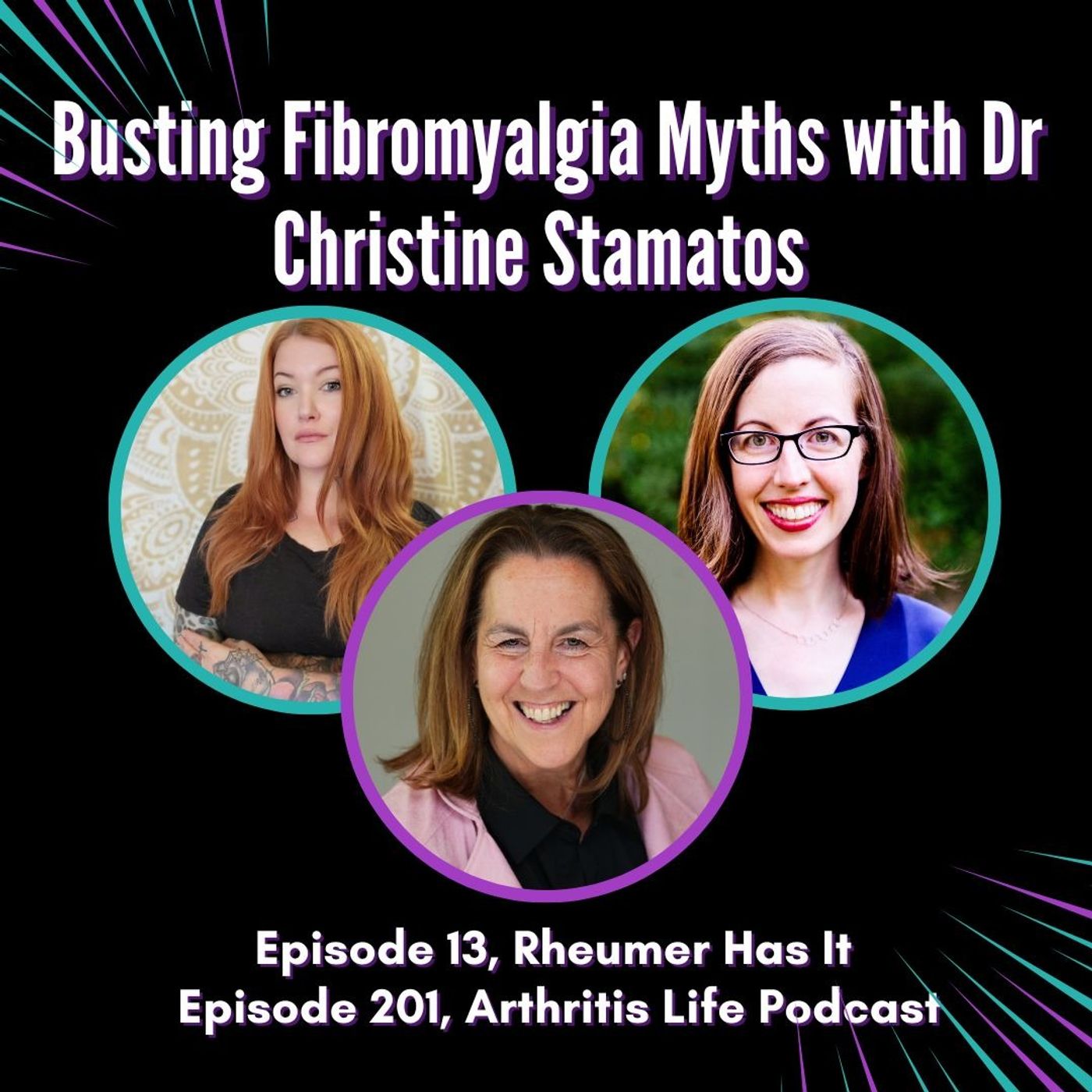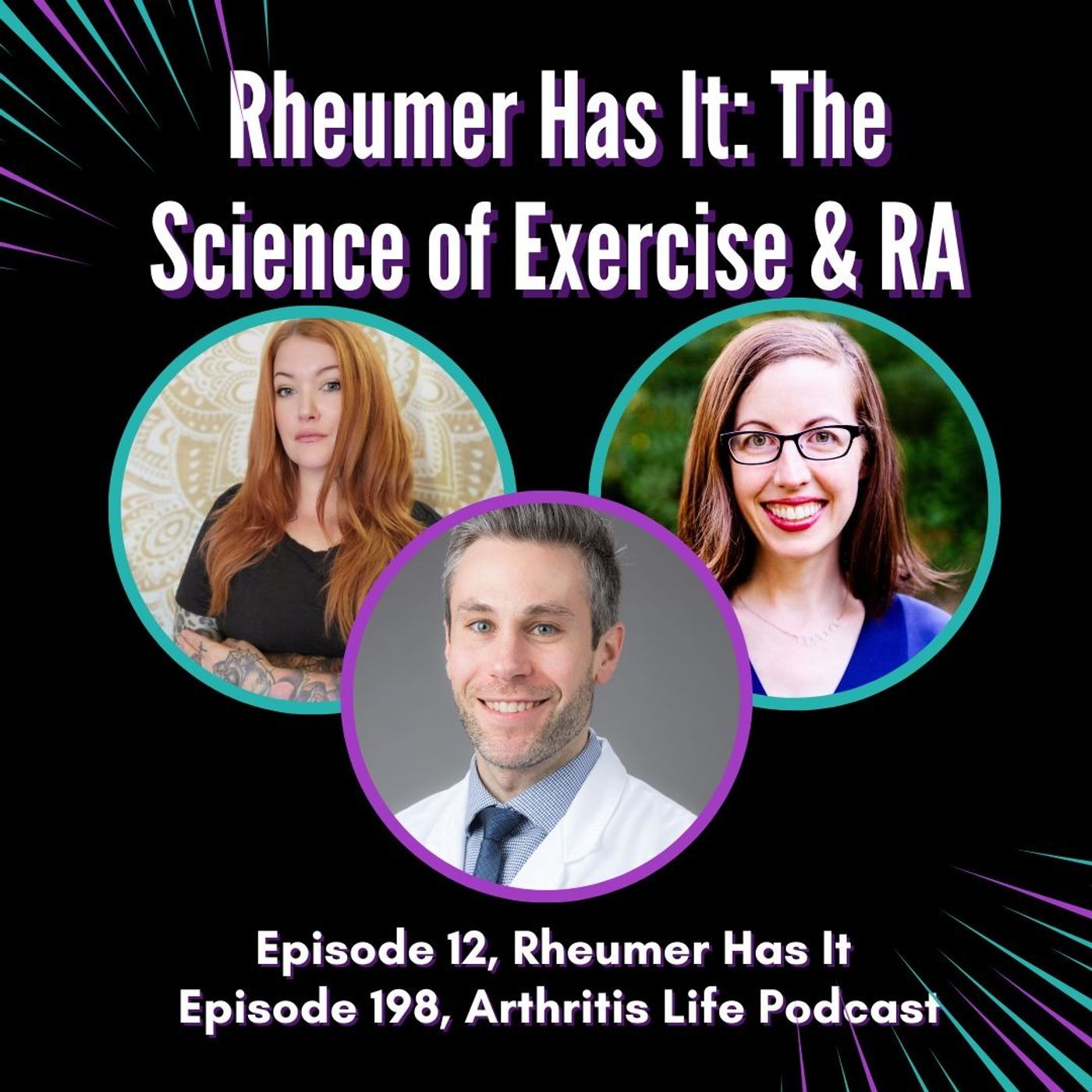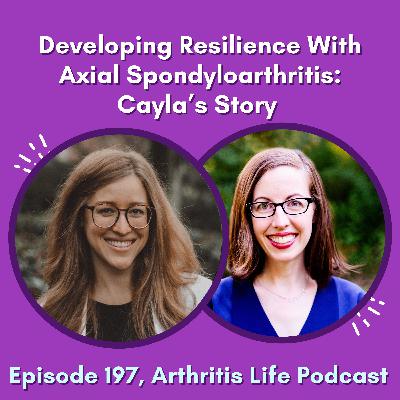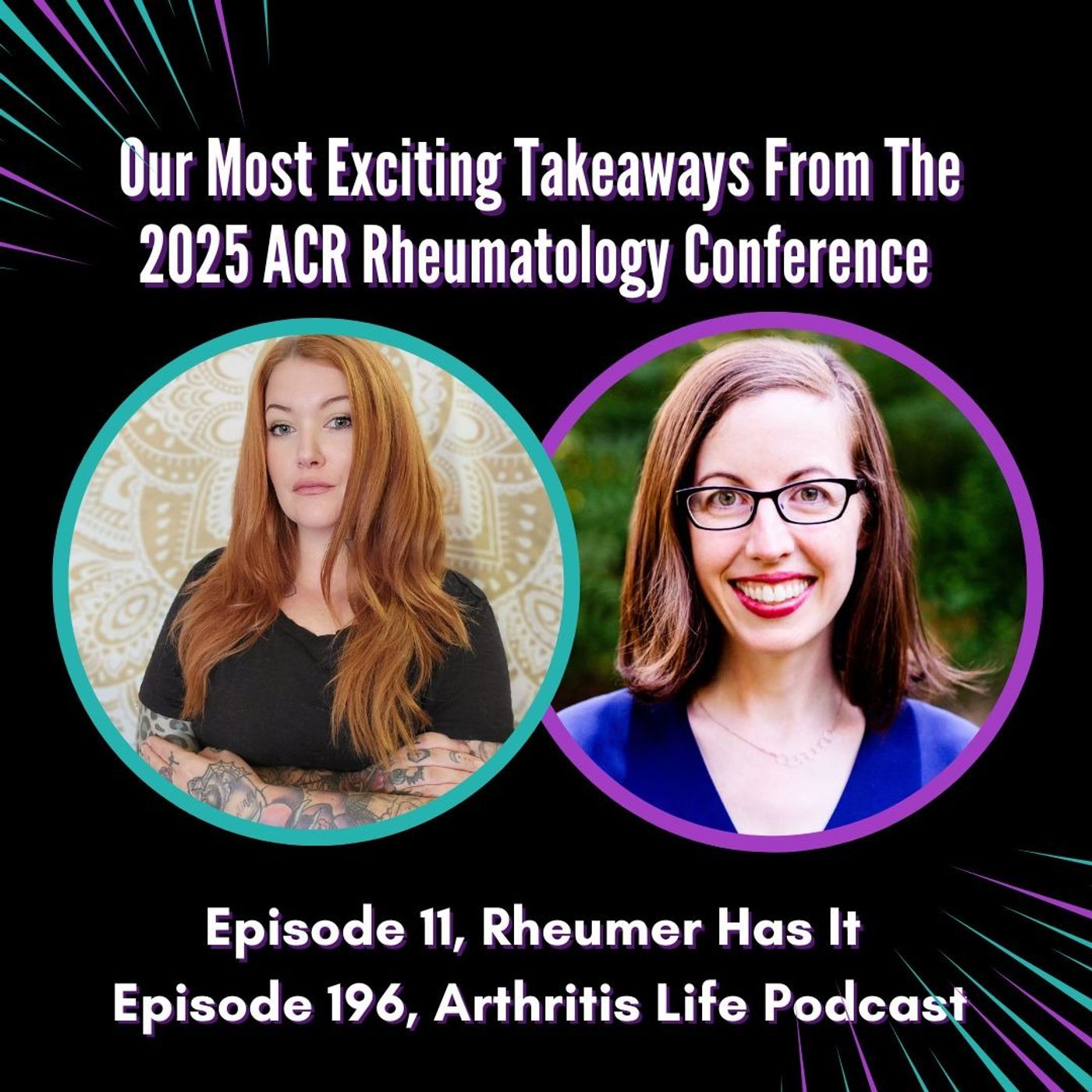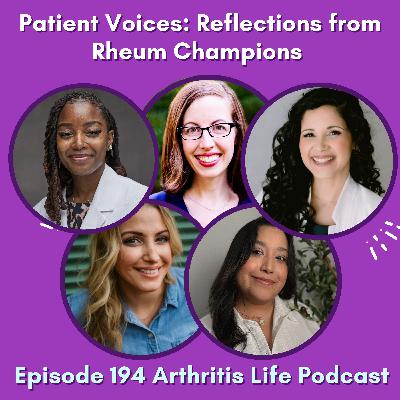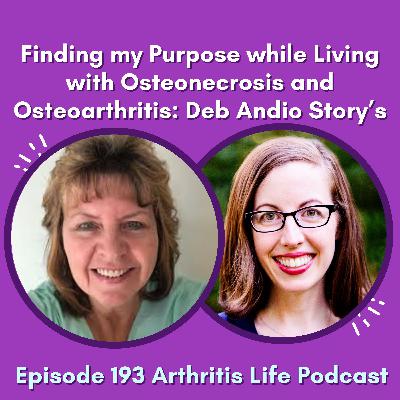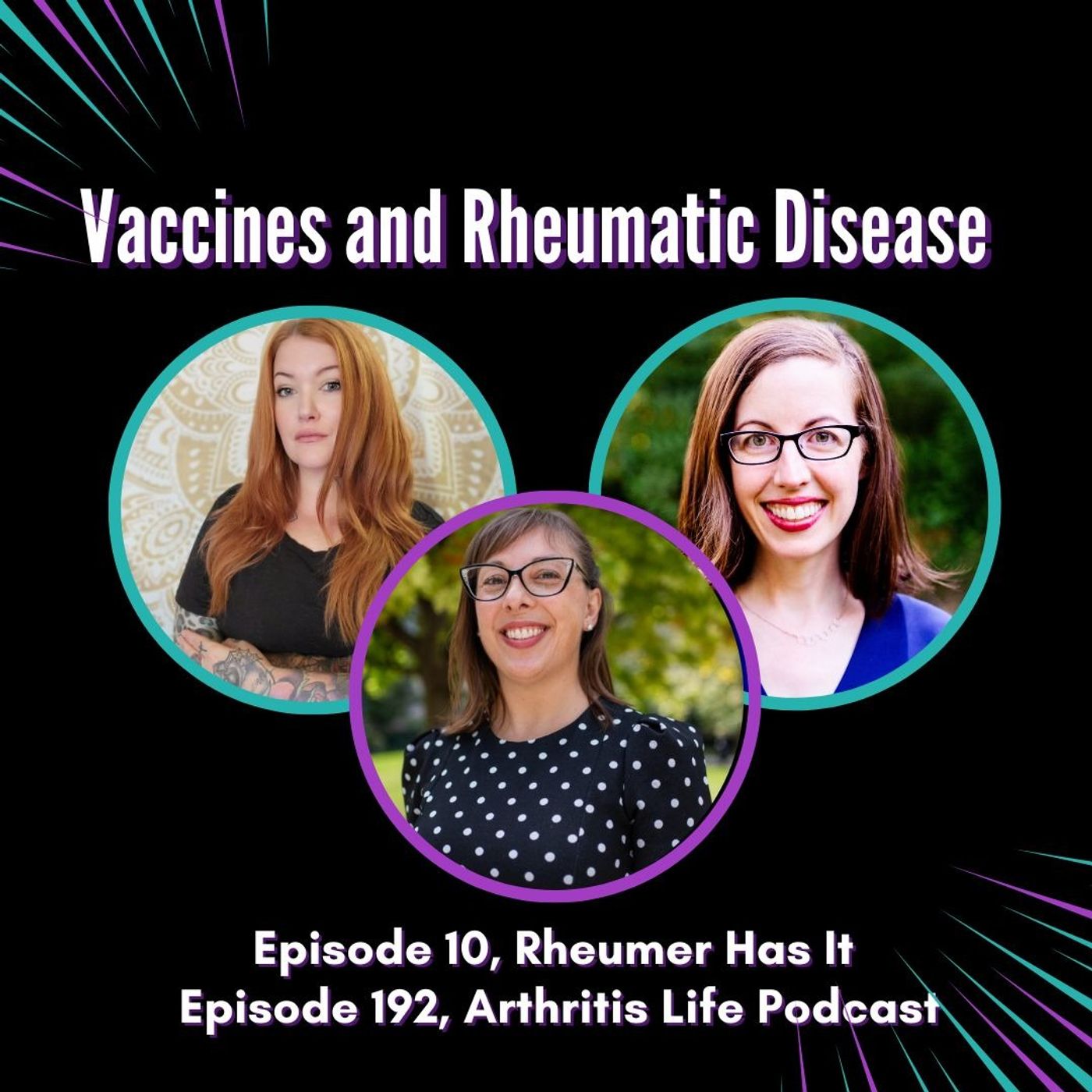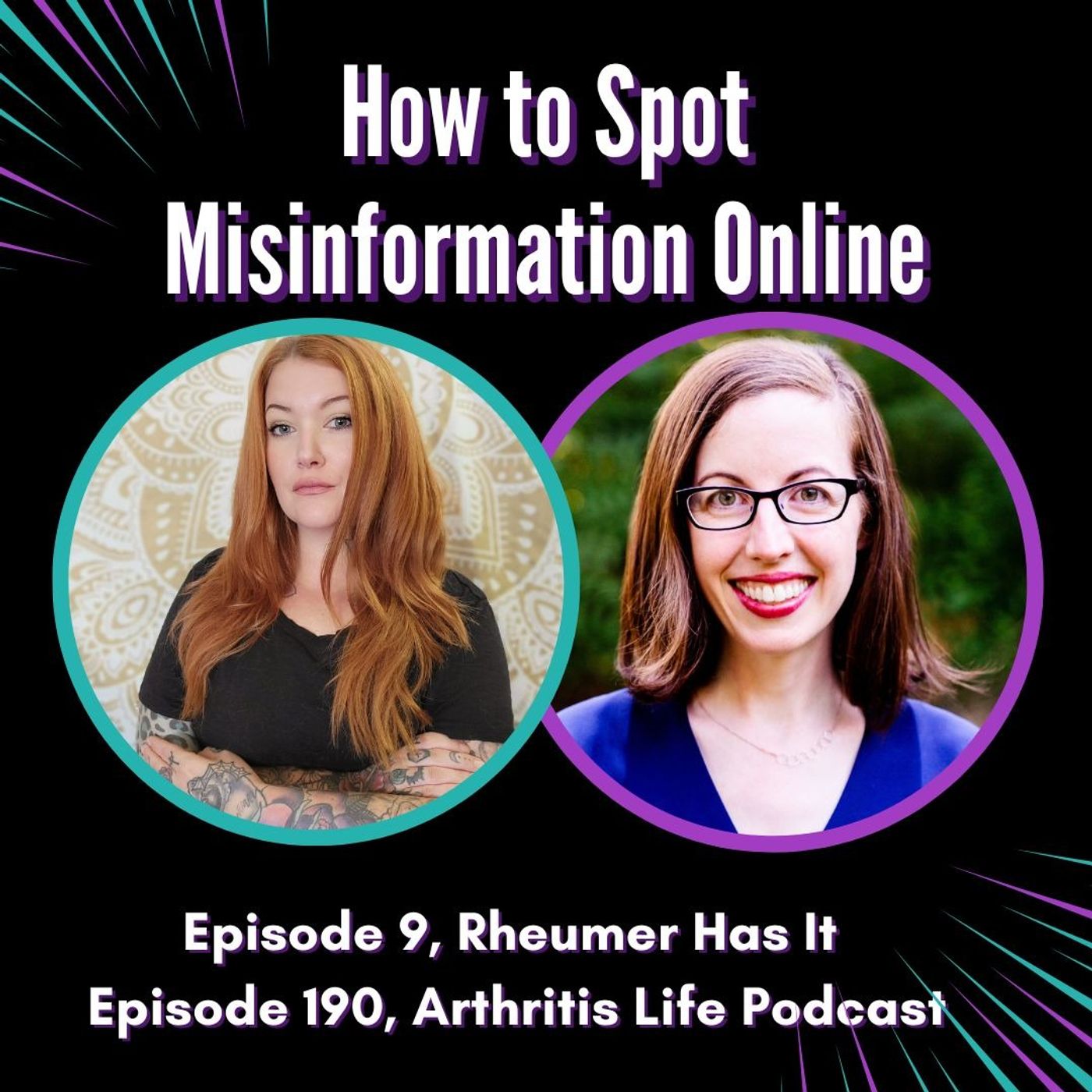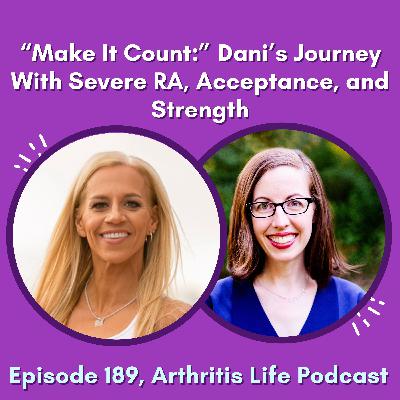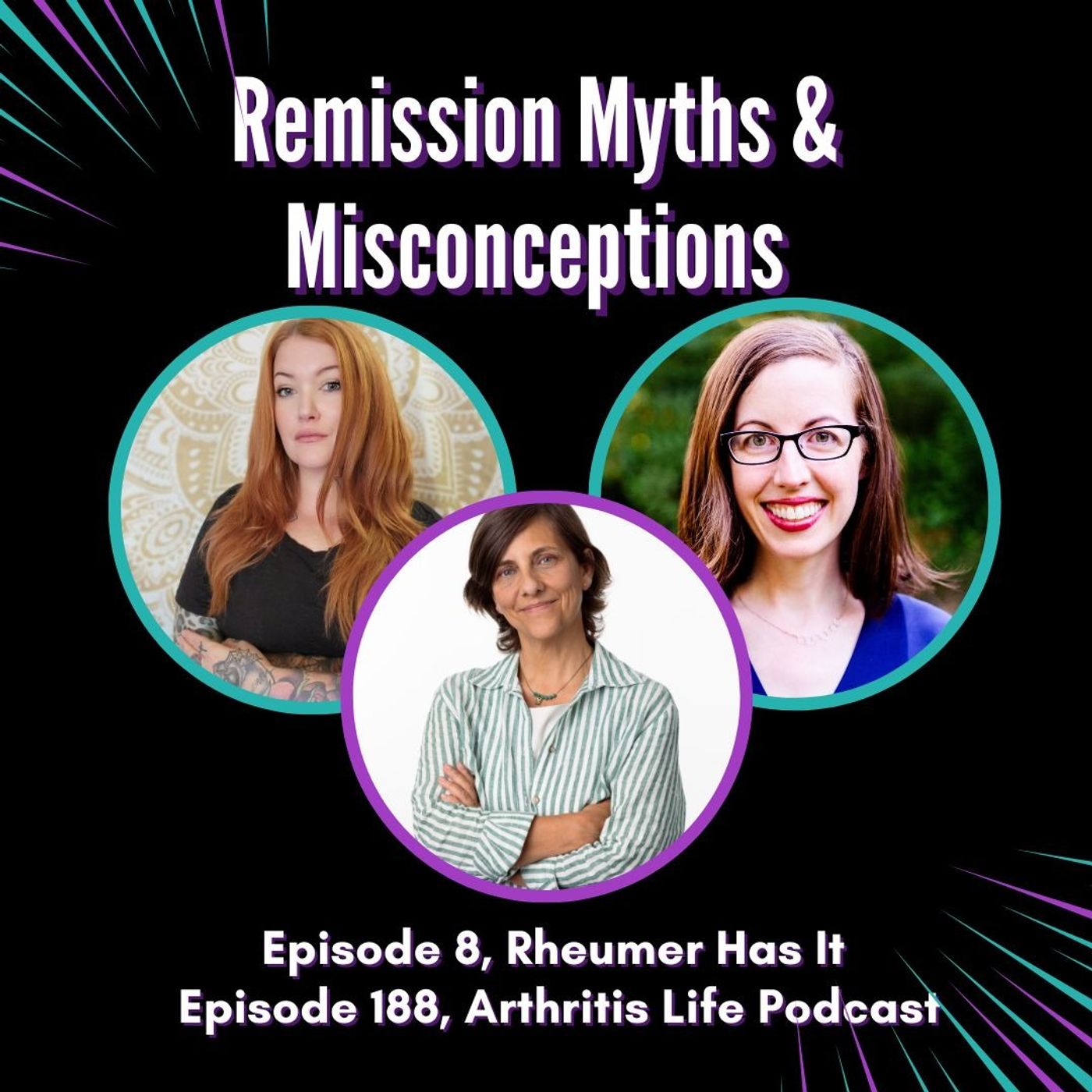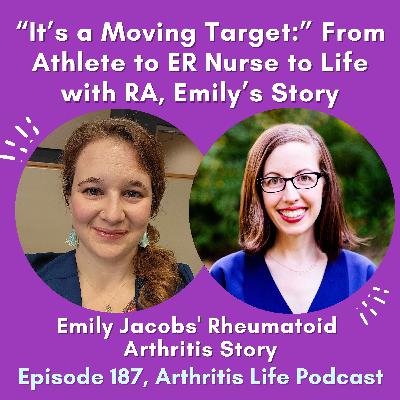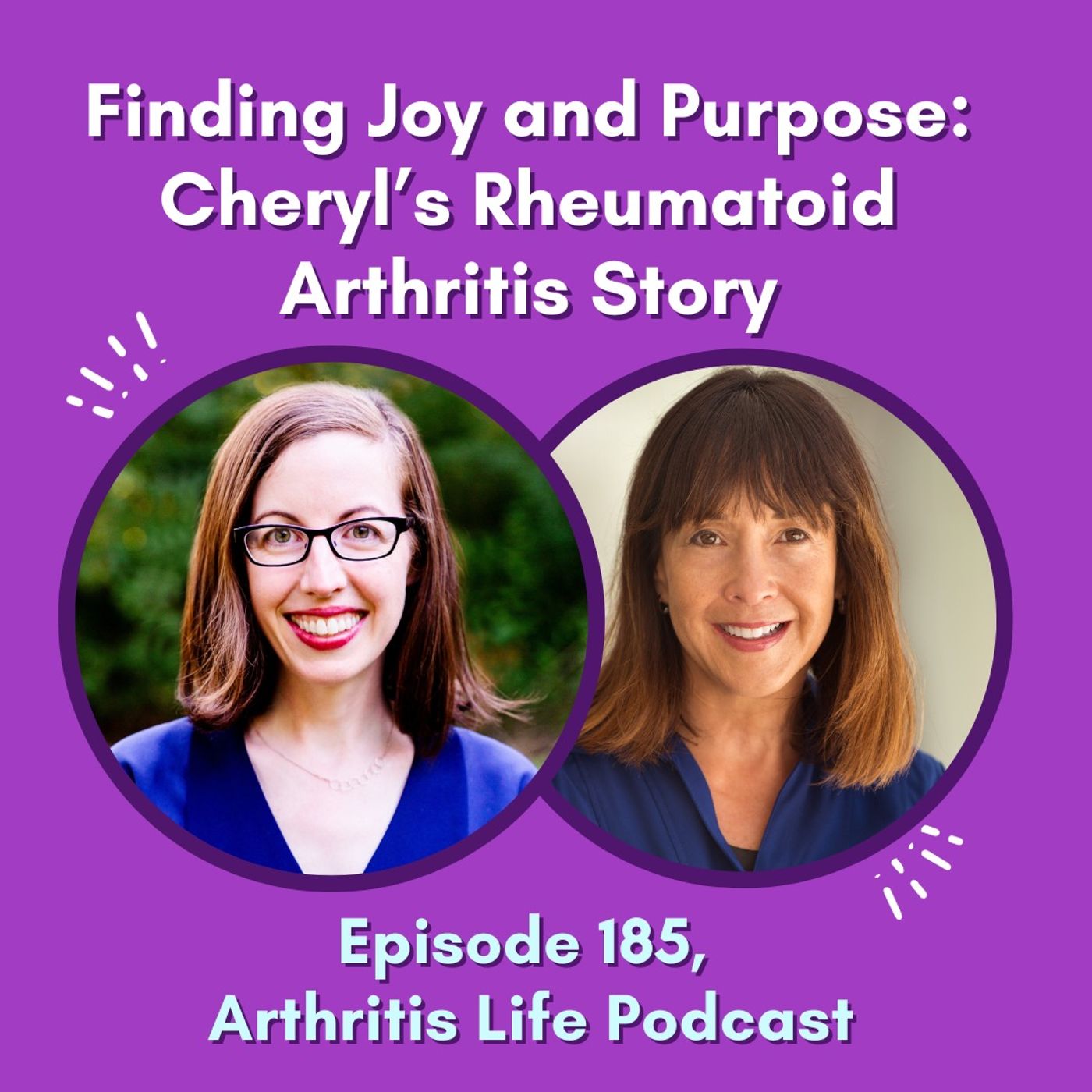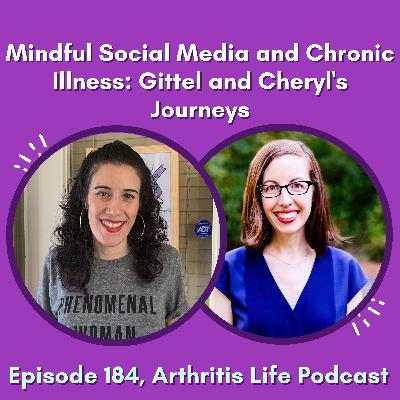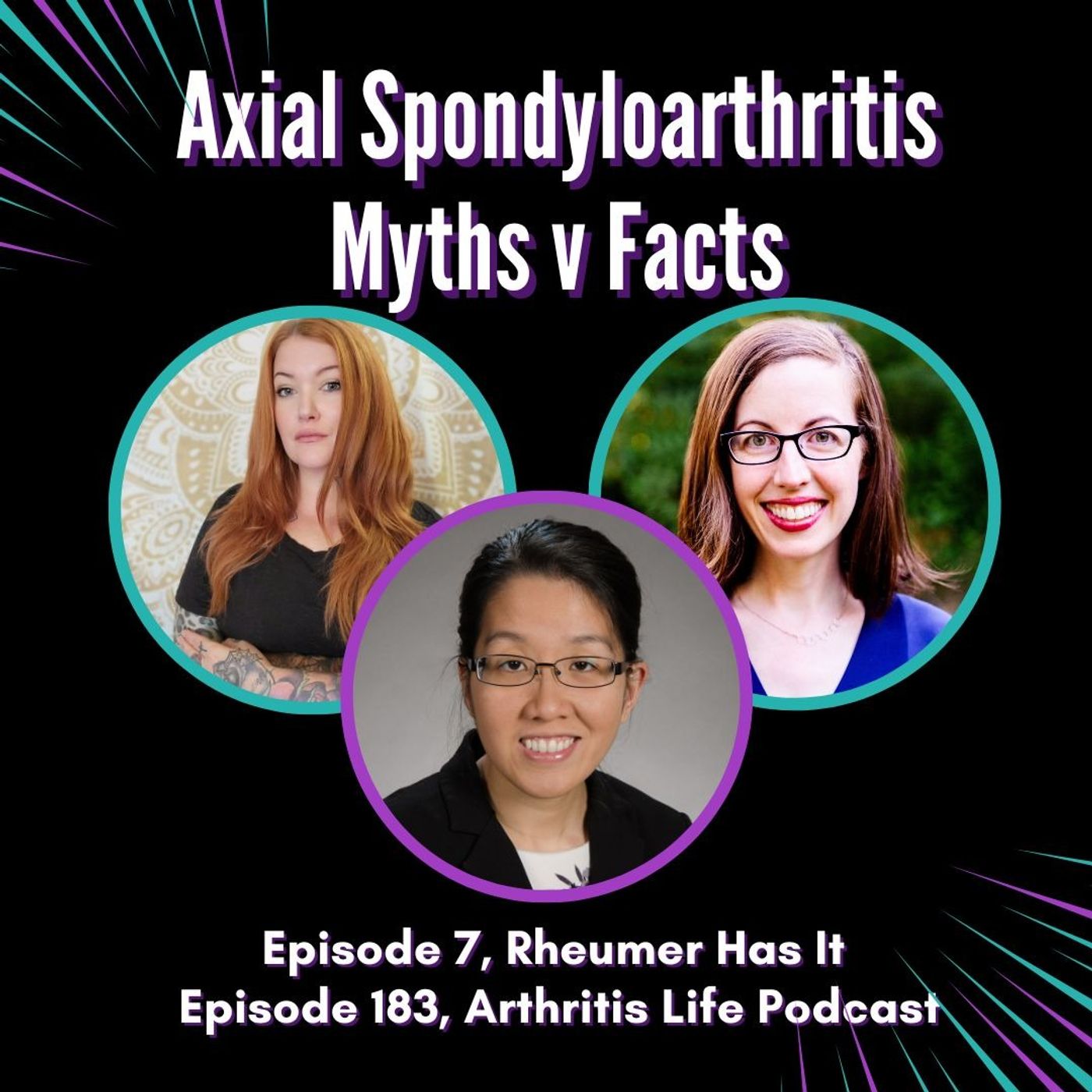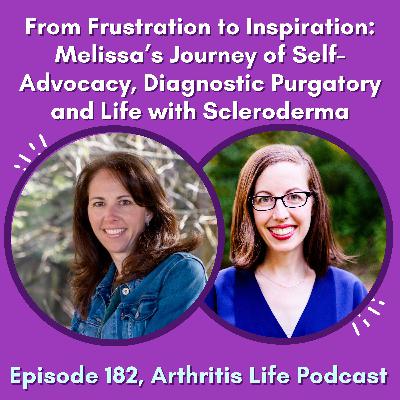Discover Arthritis Life
Arthritis Life

Arthritis Life
Author: Cheryl Crow
Subscribed: 111Played: 2,358Subscribe
Share
© 2020, Cheryl Crow & Arthritis Life
Description
Arthritis life features real patient stories, expert advice, life hacks and more to help you feel more empowered and less alone. Host Cheryl Crow shares her insights from both as a rheumatoid arthritis patient for over twenty years and as an occupational therapist, a health profession that focuses on empowering people with health challenges to function in their daily lives.
This podcast also includes reflections on how you can have the best quality of life possible despite chronic pain, anxiety and other challenging parts of chronic illness.
My goal is to help you manage REAL life with arthritis, beyond joint pain. Let's get started!
This podcast also includes reflections on how you can have the best quality of life possible despite chronic pain, anxiety and other challenging parts of chronic illness.
My goal is to help you manage REAL life with arthritis, beyond joint pain. Let's get started!
201 Episodes
Reverse
Dr. Stamatos explains why fibromyalgia is absolutely real, how it commonly overlaps with inflammatory diseases like RA, and what’s actually happening in the brain, nerves, and spinal fluid of people with fibromyalgia. She offers practical guidance for telling the difference between an RA flare and a fibromyalgia flare, explains why opioids often make fibromyalgia pain worse, and reframes treatment as a whole-person, multi-tool approach, not a single pill, diet, or supplement. This conversation is especially powerful if you’ve ever felt dismissed, blamed, or overwhelmed by mixed messages about pain, fatigue, brain fog, sleep, or mental health. You’ll walk away feeling validated, better informed, and more confident in navigating life with both conditions.Episode at a glance:Why fibromyalgia is a real, biologically based condition (and what the science actually shows) How common fibromyalgia is in people with RA and other chronic illnesses What functional MRI, nerve studies, and spinal fluid research reveal about fibromyalgia pain Why opioids often worsen pain sensitivity in fibromyalgia instead of helping How trauma, prolonged untreated pain, and stress can “turn on” fibromyalgia Practical ways to tell the difference between RA inflammation vs fibromyalgia pain The critical role of sleep, mental health, and stress regulation in pain management Why fibromyalgia treatment is a constellation of strategies, not a magic fix A compassionate explanation of catastrophizing — and how to work with uncertainty How to explain fibromyalgia to friends and family (including the Spoon Theory) Trusted resources for learning more, including The Chronic Pain Reset by Dr Afton HassettMedical disclaimer: All content found on Arthritis Life public channels (including Rheumer Has It) was created for generalized informational purposes only. The content is not intended to be a substitute for professional medical advice, diagnosis, or treatment.Episode SponsorsRheum to THRIVE, an online course and support program Cheryl created to help people with rheumatic disease go from overwhelmed, confused and alone to confident, supported and connected. See all the details and join the program or waitlist now! Hosted by Simplecast, an AdsWizz company. See pcm.adswizz.com for information about our collection and use of personal data for advertising.
Cheryl shares the origin story of the podcast, how it has evolved over time, and why storytelling remains at the center of her mission: helping people feel less alone, more informed, and more empowered to live well alongside chronic illness.Cheryl then walks through nine core themes that keep resurfacing across these conversations, including: validation and belonging, coping with uncertainty, the power of community, navigating medication decisions, redefining “normal,” and why self-compassion, acceptance, identity, and joy still matter after diagnosis. This episode is an honest reflection on what it really means to “thrive” with arthritis, not as a one-size-fits-all outcome, but as a deeply personal, evolving process rooted in realistic hope, credible information, and human connection. Episode at a glance:01:31 The Origin Story of the Podcast06:27 Challenges and Reflections on Running the Podcast13:50 Nine Core Themes from 200 Episodes14:04 Theme 1: You Are Not Alone17:12 Theme 2: The Challenge of Uncertainty20:28 Theme 3: The Power of Community22:41 Theme 4: The Importance of Credible Education26:35 Theme 5: Emotional Medication Decisions29:01 Theme 6: Redefining Normal30:52 Theme 7: Acceptance and Self-Compassion32:58 Theme 8: RA as a Whole Life Condition33:59 Theme 9: Identity, Purpose, and JoyMedical disclaimer: All content found on Arthritis Life public channels was created for generalized informational purposes only. The content is not intended to be a substitute for professional medical advice, diagnosis, or treatment.Episode SponsorsRheum to THRIVE, an online course and support program Cheryl created to help people with rheumatic disease go from overwhelmed, confused and alone to confident, supported and connected. See all the details and join the program or waitlist now! Hosted by Simplecast, an AdsWizz company. See pcm.adswizz.com for information about our collection and use of personal data for advertising.
Cheryl and Carrie discuss Carrie's diagnosis of hip dysplasia which led to osteoarthritis, her hip replacement surgeries in 2022 and 2023, and her experience running the Boston Marathon. Carrie emphasizes the importance of self-advocacy, having a strong support and care team, and setting mini goals during recovery. They also candidly talk about the emotional struggle with post-marathon blues and how time, support, and new goals helped Carrie overcome it. Overall, Carrie aims to give hope to others facing similar medical challenges.Episode at a glance:Carrie’s Arthritis and Double Hip Replacement Journey: Cheryl and Carrie discuss Carrie’s arthritis diagnosis and how that led to having double hip replacements.Carrie’s Experience Running the Boston Marathon: Carrie shares her experience of running in the Boston Marathon in April 2025. The Importance of Self-Advocacy and a Support Team: Cheryl and Carrie discuss the importance of advocating for yourself and having a strong support system to help you overcome challenges.Medical disclaimer: All content found on Arthritis Life public channels was created for generalized informational purposes only. The content is not intended to be a substitute for professional medical advice, diagnosis, or treatment.Episode SponsorsRheum to THRIVE, an online course and support program Cheryl created to help people with rheumatic disease go from overwhelmed, confused and alone to confident, supported and connected. See all the details and join the program or waitlist now! Hosted by Simplecast, an AdsWizz company. See pcm.adswizz.com for information about our collection and use of personal data for advertising.
Together, they break down common myths about fragility, rest, and “wear and tear,” while explaining why tailored exercise programs are not only safe but essential. Dr. Andonian also offers practical guidance for managing fatigue, using slow progression, and finding trustworthy exercise resources. This episode is a must-listen for anyone looking to understand how movement can improve whole-body health with RA.Episode at a glance:1. Exercise is far more than “movement” - it directly supports immune health, slows accelerated aging, and improves disease activity in RA.Dr. Andonian explains how aerobic and strength training influence inflammation, cellular metabolism, and mitochondrial function in ways that go far beyond joint comfort.2. RA is a whole-body immune disease, so exercise must be tailored, not avoided.Listeners learn why joints are actually a secondary issue in RA, why “too fragile to exercise” is a myth, and how the right mix of aerobic, strength, and mobility work can support the cardiovascular, respiratory, and immune systems.3. There is no one-size-fits-all exercise plan; successful programs must be personalized.Dr. Andonian breaks down how arthritis type, disease location, comorbidities, and fatigue shape exercise prescriptions, and why slow progression and “exercise snacks” are essential for many patients.Medical disclaimer: All content found on Arthritis Life public channels (including Rheumer Has It) was created for generalized informational purposes only. The content is not intended to be a substitute for professional medical advice, diagnosis, or treatment.Episode SponsorsRheum to THRIVE, an online course and support program Cheryl created to help people with rheumatic disease go from overwhelmed, confused and alone to confident, supported and connected. See all the details and join the program or waitlist now! Hosted by Simplecast, an AdsWizz company. See pcm.adswizz.com for information about our collection and use of personal data for advertising.
She explains the key role nurse practitioners play in rheumatology and highlights the lifestyle habits, like movement and nutrition, that have made a real difference in her own health. Cayla also offers practical advice for communicating with healthcare providers and supporting yourself after a new diagnosis.Her story is an inspiring reminder that living well with a chronic illness is not only possible, but achievable.Episode at a glance:Cayla’s personal journey with axial spondyloarthritis and the challenges of getting diagnosed youngHow nurse practitioners support patients in rheumatologyLifestyle tools Cayla uses to manage her condition, including exercise and nutritionTips for communicating effectively with healthcare providersEncouragement and practical advice for those newly diagnosedInsight into living a full, meaningful life while managing chronic illnessMedical disclaimer: All content found on Arthritis Life public channels was created for generalized informational purposes only. The content is not intended to be a substitute for professional medical advice, diagnosis, or treatment.Episode SponsorsRheum to THRIVE, an online course and support program Cheryl created to help people with rheumatic disease go from overwhelmed, confused and alone to confident, supported and connected. See all the details and join the program or waitlist now! Hosted by Simplecast, an AdsWizz company. See pcm.adswizz.com for information about our collection and use of personal data for advertising.
They also reflect on new insights into mental health, cognitive dysfunction, and the importance of the microbiome as part of lifestyle interventions. This episode offers hope, practical advice, and the latest research to help manage your condition more effectively.Episode at a glance:00:00 Introduction to Rheumer Has It00:30 Importance of the ACR Annual Conference03:02 Sessions on Patient Health Literacy and Support Groups07:10 Dietary Interventions and Microbiome Research10:54 Mental Health and Fatigue in Rheumatic Diseases15:50 Innovative Treatments: CAR T-Cell Therapy and Vagus Nerve Stimulation19:50 GLP-1 Medications and Their Benefits25:23 Cognitive Dysfunction in Rheumatic Diseases29:22 Spotlight on Sjogren's Disease31:50 Conclusion and Key TakeawaysMedical disclaimer: All content found on Arthritis Life public channels (including Rheumer Has It) was created for generalized informational purposes only. The content is not intended to be a substitute for professional medical advice, diagnosis, or treatment.Episode SponsorsRheum to THRIVE, an online course and support program Cheryl created to help people with rheumatic disease go from overwhelmed, confused and alone to confident, supported and connected. See all the details and join the program or waitlist now! Hosted by Simplecast, an AdsWizz company. See pcm.adswizz.com for information about our collection and use of personal data for advertising.
They share words of wisdom for individuals newly diagnosed with rheumatoid arthritis, emphasizing kindness, self-compassion, and love. Helen also discusses the highlights of her experience in the Rheum to THRIVE program and how it helped her adjust to her new normal. Helen also shares how using the PERMA model from positive psychology (Positive emotions, Engagement, Relationships, Meaning & Accomplishment) helps keep her life and condition manageable. She encourages taking it day by day and continuously asking oneself how to love and support oneself through the journey. This episode is a great reminder for anyone with chronic illnesses to focus on self-love to navigate the challenges of the condition.Episode at a glance:Helen’s Journey with Arthritis: Helen describes diagnosis and treatment journey as gloriously imperfect.Self Compassion: Helen and Cheryl discuss how having self-compassion is a great coping mechanism for those with chronic illnesses.PERMA Model: Cheryl and Helen discuss what the PERMA model is and how it can be helpful in chronic illness management.Rheum to THRIVE: Cheryl and Helen discuss Helen’s experience with the Rheum to THRIVE support group.Medical disclaimer: All content found on Arthritis Life public channels was created for generalized informational purposes only. The content is not intended to be a substitute for professional medical advice, diagnosis, or treatment.Episode SponsorsRheum to THRIVE, an online course and support program Cheryl created to help people with rheumatic disease go from overwhelmed, confused and alone to confident, supported and connected. See all the details and join the program or waitlist now! Hosted by Simplecast, an AdsWizz company. See pcm.adswizz.com for information about our collection and use of personal data for advertising.
They discuss how they became Rheum Champions, their personal journeys with conditions like rheumatoid arthritis, lupus, PCOS, and more, and the importance of community and support. The episode also highlights significant takeaways from the meeting, including research updates, the passion of the researchers, and the heartwarming sense of community. This podcast serves as a powerful reminder of how important it is to integrate the patient voice into rheumatology research. *This episode was originally recorded for the My Spoonie Sisters podcast. Episode at a glance:00:00 Welcome to the Rheum Champions Tell All01:59 Introducing the Rheum Champions03:55 Sharing Our Stories: The Journey to Advocacy07:13 The Impact of Community and Support10:55 Becoming a Rheum Champion16:09 Highlights from the 2025 Investigators Meeting24:52 Final Thoughts and How to Get InvolvedMedical disclaimer: All content found on Arthritis Life public channels was created for generalized informational purposes only. The content is not intended to be a substitute for professional medical advice, diagnosis, or treatment.Episode SponsorsRheum to THRIVE, an online course and support program Cheryl created to help people with rheumatic disease go from overwhelmed, confused and alone to confident, supported and connected. See all the details and join the program or waitlist now! Hosted by Simplecast, an AdsWizz company. See pcm.adswizz.com for information about our collection and use of personal data for advertising.
Beyond her personal battle, Deb has established a global support group for those with osteonecrosis and actively participates in the Arthritis Foundation's Live Yes! Connect groups. Highlighting the power of community support and advocacy, Deb's story is an inspiring testament to resilience and the importance of helping others navigate similar health challenges.Episode at a glance:Deb’s Journey: Cheryl and Deb discuss Deb’s journey with osteoarthritis and osteonecrosis.The Power of Community: Deb shares how having a community is important for support and connection in the chronic illness world.Deb’s Support Groups: Cheryl and Deb discuss Deb’s global support groups and the Arthritis Foundation’s Live Yes! Connect groups. Medical disclaimer: All content found on Arthritis Life public channels was created for generalized informational purposes only. The content is not intended to be a substitute for professional medical advice, diagnosis, or treatment.Episode SponsorsRheum to THRIVE, an online course and support program Cheryl created to help people with rheumatic disease go from overwhelmed, confused and alone to confident, supported and connected. See all the details and join the program or waitlist now! Hosted by Simplecast, an AdsWizz company. See pcm.adswizz.com for information about our collection and use of personal data for advertising.
Dr. Edens debunks common misconceptions, such as vaccines causing autoimmune diseases or always triggering flares. She explains that while mild immune responses are normal, serious complications are extremely rare and the benefits far outweigh the risks. Dr Edens emphasizes that vaccines not only prevent infections but also certain cancers, making them an essential part of care for immunosuppressed patients. The discussion also explores vaccine timing with medications, the dangers of misinformation, and how to talk about vaccine hesitancy with empathy and evidence.Episode at a glance:Guest Expert: Dr. Cuoghi Edens, dual-trained adult and pediatric rheumatologist at the University of Chicago.Myth #1: “Natural is better than vaccines” — Debunked; vaccines dramatically reduce child and adult mortality from infectious diseases.Myth #2: “Vaccines cause autoimmune diseases” — Overwhelming evidence shows they do not.Myth #3: “Vaccines always cause flare-ups” — Possible but uncommon; most patients tolerate vaccines well, and disease prevention outweighs brief discomfort.Risk–Benefit Balance: Vaccines protect against infections and cancers (HPV, hepatitis B) that can worsen or complicate autoimmune diseases.Timing & Medications: ACR guidelines suggest coordination with treatments like rituximab and high-dose steroids, but partial protection is better than none.Health Literacy Tip: “Doing research” means reviewing credible scientific evidence—not social-media opinions or cherry-picked studies.Social Stigma: Addresses misinformation, polarization, and “anti-vax” rhetoric, highlighting the need for compassion and critical thinking.Trusted Resources: Children’s Hospital of Philadelphia vaccine education site and American College of Rheumatology guidelines.Key Takeaway: Vaccines are safe, vital, and empowering tools for people with autoimmune diseases.Medical disclaimer: All content found on Arthritis Life public channels (including Rheumer Has It) was created for generalized informational purposes only. The content is not intended to be a substitute for professional medical advice, diagnosis, or treatment.Episode SponsorsRheum to THRIVE, an online course and support program Cheryl created to help people with rheumatic disease go from overwhelmed, confused and alone to confident, supported and connected. See all the details and join the program or waitlist now! Full Episode Show Notes:Go to the episode page on the Arthritis Life website for full details including a transcript and video! Hosted by Simplecast, an AdsWizz company. See pcm.adswizz.com for information about our collection and use of personal data for advertising.
Together, they unpack common myths surrounding food and autoimmune conditions and share practical, real-life strategies for self-management. It’s a conversation packed with practical advice and empowering insights for anyone looking to make nutrition more manageable while living with an autoimmune condition.Episode at a glance:Common misconceptions about diet and autoimmune diseases: Cheryl and Dr. Singla discuss common myths about diet and nutrition for autoimmune diseases.How Dr. Singla adapts her kitchen for comfort and efficiency: Organizing items to avoid reaching or bending, using pre-chopped ingredients to reduce strain, utilizing assistive kitchen tools (many available on Amazon)Creative, real-life kitchen strategies: Wearing weightlifting gloves for cutting tough vegetables, prepping water ahead of time to avoid lifting heavy potsMedical disclaimer: All content found on Arthritis Life public channels was created for generalized informational purposes only. The content is not intended to be a substitute for professional medical advice, diagnosis, or treatment.Episode SponsorsRheum to THRIVE, an online course and support program Cheryl created to help people with rheumatic disease go from overwhelmed, confused and alone to confident, supported and connected. See all the details and join the program or waitlist now! Hosted by Simplecast, an AdsWizz company. See pcm.adswizz.com for information about our collection and use of personal data for advertising.
They share examples of how misinformation can lead to physical harm, wasted money, and delayed treatment, and emphasize the importance of critical thinking and media literacy. The hosts introduce practical tools such as the “CRAAP test” for evaluating sources and encourage listeners to seek balanced, evidence-based hope rather than false promises of cures.Episode at a Glance — Main Themes🌐 Why misinformation spreads: Emotional vulnerability after diagnosis, grief, and the appeal of “quick fixes.” ⚠️ Common myths: “Natural is better,” “medications are worse than the disease,” “vaccines cause autoimmune issues,” and “dietary cures can reverse disease.” 💊 Real risks: Financial loss, physical harm (e.g., liver damage from supplements), and worsening disease due to delayed or stopped treatment. 🧠 Critical thinking tools: Using the CRAAP test, recognizing cherry-picking and predatory journals, and assessing conflicts of interest. 💬 Empowered decision-making: Encouragement to “go to the source,” value science-based hope, and stay informed through credible experts and patient advocates.Medical disclaimer: All content found on Arthritis Life public channels (including Rheumer Has It) was created for generalized informational purposes only. The content is not intended to be a substitute for professional medical advice, diagnosis, or treatment.Episode SponsorsRheum to THRIVE, an online course and support program Cheryl created to help people with rheumatic disease go from overwhelmed, confused and alone to confident, supported and connected. See all the details and join the program or waitlist now! Hosted by Simplecast, an AdsWizz company. See pcm.adswizz.com for information about our collection and use of personal data for advertising.
Cheryl and Dani dig into the diagnosis saga, evolving RA treatments, the role of acceptance, and why movement is essential to living well with rheumatic disease. For Dani, “movement” isn’t only physical; it’s emotional, spiritual, and educational. If you’re newly diagnosed, this conversation is a powerful reminder to make every day count.Episode at a glance:Dani’s Diagnosis Journey: Cheryl and Dani discuss Dani’s journey to being diagnosed with rheumatoid arthritis.How Dani Rebuilt her Life: Dani recounts how she rebuilt her life after her diagnosis by slowly reintroducing weights and working through mental health challenges. The Importance of Movement: Cheryl and Dani discuss the importance of movement for those with arthritis, beyond physical movement.Make it Count for Dani: Dani and Cheryl delve into Dani’s non-profit organization which provides support and hope for those living with RA.Medical disclaimer: All content found on Arthritis Life public channels was created for generalized informational purposes only. The content is not intended to be a substitute for professional medical advice, diagnosis, or treatment.Episode SponsorsRheum to THRIVE, an online course and support program Cheryl created to help people with rheumatic disease go from overwhelmed, confused and alone to confident, supported and connected. See all the details and join the program or waitlist now! Hosted by Simplecast, an AdsWizz company. See pcm.adswizz.com for information about our collection and use of personal data for advertising.
On this special episode* of 'Rheumer has It', hosts Eileen and Cheryl are joined by renowned rheumatologist Dr. Loreto Carmona from Spain. The discussion centers around the concept of remission in rheumatoid arthritis (RA), highlighting the differences between medical and patient perspectives on what constitutes remission. Dr. Carmona emphasizes the importance of communication between patients and doctors, the role of medications and lifestyle factors, and the myths surrounding RA remission.This insightful conversation is part of the Canadian Talk Over RA campaign, aimed at providing hope and clear knowledge to those living with RA. See the full show notes on the Arthritis Life website for more details.Episode at a glance:00:31 Meet Dr. Loreto Carmona01:31 Defining Remission in Rheumatoid Arthritis04:26 Misconceptions About Remission07:38 Factors Influencing Remission11:30 The Importance of Communication14:48 Historical Perspectives on RA Treatment16:12 Final Thoughts and ResourcesMedical disclaimer:All content found on Arthritis Life public channels (including Rheumer Has It) was created for generalized informational purposes only. The content is not intended to be a substitute for professional medical advice, diagnosis, or treatment.Episode SponsorsRheum to THRIVE, an online course and support program Cheryl created to help people with rheumatic disease go from overwhelmed, confused and alone to confident, supported and connected. See all the details and join the program or waitlist now!**Special Episode Sponsor: Talk Over RA CampaignAD - Talk Over RA is more than a campaign — it’s a call to action. This podcast episode is part of the Talk Over RA 2025 campaign and is sponsored by AbbVie Canada. All content and opinions are Eileen Davidson, Cheryl Crow and Dr. Loreto’s own and are not intended to promote any specific pharmaceutical products.Rheumatoid arthritis doesn’t just speak through pain and fatigue — it interrupts plans, drains energy, and creates uncertainty even when symptoms are quiet. The Talk Over RA initiative encourages people living with RA to take back control by speaking up, sharing their experiences, and working with healthcare providers to set meaningful treatment goals.Eileen’s role in this campaign is to provide tools that help you prepare for appointments, explore what remission could look like, and connect with others who truly understand.Don’t let RA speak louder than you. Explore the campaign and download the guide here.For full episode show notesGo to the episode page on the Arthritis Life Website here. Hosted by Simplecast, an AdsWizz company. See pcm.adswizz.com for information about our collection and use of personal data for advertising.
On this episode, Emily and Cheryl discuss how they've come to terms with the fluctuating, non-linear, dynamic nature of rheumatoid arthritis. After being a fierce athlete and playing Division 1 water polo, Emily was diagnosed with rheumatoid arthritis at age 22. She shares lessons learned while working as a night shift nurse for 12 years and having three children. Emily opens up about using cannabis as part of her care, the importance of mental health support, and why community has been so vital, especially through Cheryl’s Rheum to THRIVE program. Together, Cheryl and Emily reflect on coping with uncertainty, redefining identity, and what it means to live a good life with RA. This is an encore presentation of episode 85, which first appeared in December, 2022.Medical disclaimer:All content found on Arthritis Life public channels was created for generalized informational purposes only. The content is not intended to be a substitute for professional medical advice, diagnosis, or treatment.Episode SponsorsRheum to THRIVE, an online course and support program Cheryl created to help people with rheumatic disease go from overwhelmed, confused and alone to confident, supported and connected. See all the details and join the program or waitlist now! For full episode show notes:Go to the episode page on the Arthritis Life Website. Hosted by Simplecast, an AdsWizz company. See pcm.adswizz.com for information about our collection and use of personal data for advertising.
Diagnosed at just 15, Zac opens up about the difficult shift from being an active athlete to facing disability caused by arthritis and its complications. He shares how strength training became a turning point and helped him regain mobility, lose weight, and rebuild a fulfilling life. He also explores how his background in strength training helped him survive a near death experience with macrophage activation syndrome.Together, Cheryl and Zac explore the role of exercise in managing arthritis, offering practical tips, tools, and encouragement for others navigating similar challenges. Zac highlights the importance of pairing medical treatment with disciplined strength training to enhance both health and quality of life.Episode at a glance:Zac’s Diagnosis Journey: Zac Spinosa, 28-year-old personal trainer living with Juvenile Idiopathic Arthritis (JIA), shares the challenges of shifting from active athlete to living with disability. Turning Point: How strength training helped Zac regain mobility, lose weight, and rebuild his lifePractical Takeaways: Tips, tools, and advice for using exercise to manage arthritis effectivelyHolistic Approach: The importance of combining medical treatment with disciplined strength trainingInspiration for Listeners: Finding resilience, strength, and quality of life while navigating chronic illnessMedical disclaimer: All content found on Arthritis Life public channels was created for generalized informational purposes only. The content is not intended to be a substitute for professional medical advice, diagnosis, or treatment.Episode SponsorsRheum to THRIVE, an online course and support program Cheryl created to help people with rheumatic disease go from overwhelmed, confused and alone to confident, supported and connected. See all the details and join the program or waitlist now! Hosted by Simplecast, an AdsWizz company. See pcm.adswizz.com for information about our collection and use of personal data for advertising.
Cheryl shares her powerful journey of being diagnosed with rheumatoid arthritis (RA) at just 21 years old and reflects on what it was like to go from being a healthy, athletic college student to suddenly navigating pain, fatigue, and disbelief from doctors. She opens up about the emotional toll of feeling dismissed, the relief of finally getting a diagnosis, and the lessons she’s learned about acceptance, self-compassion, and living fully despite chronic illness. She also shares how her experiences led her to create the Rheum to THRIVE educational program and support group, so that no one has to navigate life with RA alone. Cheryl and Dr. Hassett explore the realities of RA that often go misunderstood, from unpredictable flare-ups, invisible symptoms, and the mental health challenges of chronic illness. Cheryl also shares the strategies that help her thrive today: pacing her energy, building community, protecting sleep, and seeking out moments of joy. If you’re feeling lost or overwhelmed after your own diagnosis, this conversation will remind you that you’re not alone, and that it is possible to find purpose, hope, and connection while living with RA.This conversation originally occurred in 2024 and first appeared on the "Chronic Pain Reset” podcast, hosted by pain psychologist Dr. Afton Hassett. Medical disclaimer: All content found on Arthritis Life public channels was created for generalized informational purposes only. The content is not intended to be a substitute for professional medical advice, diagnosis, or treatment.Episode SponsorsRheum to THRIVE, an online course and support program Cheryl created to help people with rheumatic disease go from overwhelmed, confused and alone to confident, supported and connected. See all the details and join the program or waitlist now! For full episode detailsGo to the show notes page on the Arthritis Life Website. Hosted by Simplecast, an AdsWizz company. See pcm.adswizz.com for information about our collection and use of personal data for advertising.
Cheryl and Gittel explore the importance of being mindful with our social media use. While they highlight the risks of falling into negative patterns that can lead to isolation, they also emphasize social media’s powerful potential for connection and support among those living with chronic illness.Gittel shares how participating in online support communities like Rheum to THRIVE has strengthened her self-management and coping strategies. Together, Cheryl and Gittel stress the importance of setting intentional goals for social media use, fostering connection, protecting mental health, and ultimately avoiding the trap of isolation.Episode at a glance:Milestone guest return: Gittel joins the podcast for her fifth appearance and reflections on her journey with Crohn’s disease and ankylosing spondylitis.Rheum To Thrive: Gittel reflects on how her relationship with the Rheum to Thrive program has grown over time.Mindful social media use: Comparing patterns of use, misuse, and abuse to drug use.The double-edged sword of social media: Exploring both its risks (isolation, negative cycles) and benefits (connection, support).Personal impact: Gittel’s story of how online support communities improved her coping and self-management.Practical takeaways: Setting intentional goals for social media to foster connection, protect mental health, and avoid isolation.Medical disclaimer: All content found on Arthritis Life public channels was created for generalized informational purposes only. The content is not intended to be a substitute for professional medical advice, diagnosis, or treatment.Episode SponsorsRheum to THRIVE, an online course and support program Cheryl created to help people with rheumatic disease go from overwhelmed, confused and alone to confident, supported and connected. See all the details and join the program or waitlist now! Hosted by Simplecast, an AdsWizz company. See pcm.adswizz.com for information about our collection and use of personal data for advertising.
Dr. Liew shares her personal journey to becoming a rheumatologist inspired by a friend's diagnosis. She then discusses the condition in detail, addressing common misconceptions such as it being exclusive to white men and always showing up on imaging. Listeners will gain invaluable insights into the challenges of diagnosing this condition, social determinants affecting diagnosis, and reliable resources for further information. This episode is a must-listen for anyone navigating the labyrinth of rheumatic diseases, providing hope and knowledge to help you thrive.Episode at a glance:00:00 Introduction to Rheumer Has It Podcast00:26 Meet Dr. Jean Liew: Expert on Axial Spondyloarthritis00:40 Understanding Axial Spondyloarthritis01:41 Dr. Liew's Journey into Rheumatology04:16 Busting Myths: Axial Spondyloarthritis and Demographics (it’s not just men!)06:50 Challenges in Diagnosing Axial Spondyloarthritis10:27 The Role of HLAB 27 in Axial Spondyloarthritis12:26 Imaging and Axial Spondyloarthritis14:38 Final Thoughts and ResourcesMedical disclaimer: All content found on Arthritis Life public channels (including Rheumer Has It) was created for generalized informational purposes only. The content is not intended to be a substitute for professional medical advice, diagnosis, or treatment.Episode SponsorsRheum to THRIVE, an online course and support program Cheryl created to help people with rheumatic disease go from overwhelmed, confused and alone to confident, supported and connected. See all the details and join the program or waitlist now! Hosted by Simplecast, an AdsWizz company. See pcm.adswizz.com for information about our collection and use of personal data for advertising.
Cheryl and Melissa discuss her experiences in the healthcare system, driven by frustration to become a self-advocate. This led Melissa to write the book Invisible: a Nurse Turned Patient's Resource to Living Well with Autoimmune Disease, aiming to provide validation and resources for others facing similar struggles. Cheryl and Melissa also touch on the challenges of advocating for oneself, misconceptions in the medical field, the impact of invisible illnesses, and the importance of finding purpose and joy while living with chronic conditions.Episode at a glance:Melissa’s Journey: Cheryl and Melissa discuss Melissa’s long diagnosis journey.Navigating the Healthcare System: Melissa shares what it was like to navigate the healthcare system as a nurse turned patient.Self-Advocacy: Cheryl and Melissa discuss the importance of self advocacy. Melissa’s Book: Melissa shares her journey of writing her new book, Invisible: a Nurse Turned Patient's Resource to Living Well with Autoimmune Disease.Medical disclaimer: All content found on Arthritis Life public channels was created for generalized informational purposes only. The content is not intended to be a substitute for professional medical advice, diagnosis, or treatment.Episode SponsorsRheum to THRIVE, an online course and support program Cheryl created to help people with rheumatic disease go from overwhelmed, confused and alone to confident, supported and connected. See all the details and join the program or waitlist now! Hosted by Simplecast, an AdsWizz company. See pcm.adswizz.com for information about our collection and use of personal data for advertising.


